Category: Thread For Humanity
-

Family, Diwali and more… Building bridges through Playback Theatre
September 30, 2019 New DelhiPlayback Theatre (PT) has been a recent addition to our repertoire of tools while working with Children in Conflict with Law. Our first ever Playback session with CICL came in May 2017 when we conducted an awareness and capacity building session on ‘Dreams, Delinquency and Destitution’ at the Delhi Judicial Academy. The audience members included members of the Child Welfare Committee (CWC), Juvenile Justice Boards (JJB) and civil society members working in the field of Juvenile Justice. Many office bearers were moved into sharing the aspirations they had when they were younger, bringing home the power of PT to connect different stakeholders through shared experiences Ever since then, Playback has become an active component of our Expressive Arts inventory
As part of our research study at the Place of Safety and Special Home for Boys, Majnu ka Tila, we used Playback as a standalone Expressive Arts tool to bring out stories and emotions that our participants were otherwise inhibited to express. The session ultimately became one of our most powerful and memorable experiences at the Home. It was the first time we were able to connect all participants beyond enmities and conflicts in a Communitas based on family and memories of Diwali.
We went on to conduct another Playback session in December 2018 as part of our ‘Open Day’ celebrations during the study. We invited family members of our participants, Superintendents of other Homes and Magistrates working at JJB to be a part of the day’s proceedings. After our participants displayed their work, this gathering became the audience for the Playback session. To our surprise, the senior officials opened up about the vulnerabilities around family and memories of childhood.
In this way, we managed to find ‘common threads’ for everyone involved to look at each other beyond the lens of a case number, a mistrusting judge or quite simply ‘a court date’. Playback, was largely successful in making this human connect come to life.
Our observations have been carefully recorded in a research paper titled ‘Playback Theatre with Children in Conflict with Law: An exploratory study’, which will be presented at the International Playback Theatre Network conference to be held in Bangalore this December.
-
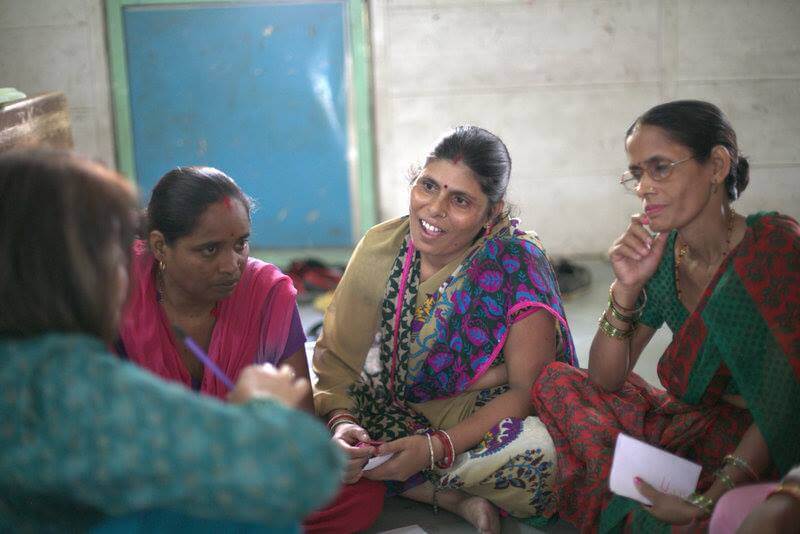
Community Outreach Workshops @ Jahangirpuri
November 7, 2017“I have realised that crime in the area will be reduced only when we work together. I would like to get associated with you and start working towards this. I would like to continue these workshops in the future ‘didi’ (meaning older sister, referring to Ms. Puneeta Roy in this case). Please keep coming”
– Rinki, a resident of Jahangirpuri was part of our Community Theatre workshops. Her children study in the local government school. “We can’t keep our houses unmanned or kids alone in the area because of constant threat to their lives”. Jahangirpuri is filled with such stories that need to be heard. Rinki particularly enjoyed pen-making as part of our up-cycling workshops. One afternoon during the mirror exercise, she broke down as she received love and affection from her fellow participant that she hadn’t received in her own home.
Our entry into Jahangir Puri comes at the back of our work in the Aadharshila Observation Home for Boys, G.T.B Nagar for the best part of the last decade. Our interactions with the children, magistrates and key members of the Home made us aware about this area’s notorious reputation as a hotbed of crime and inhuman living conditions. Our consequent interventions have focused on understanding the socio-economic construct of ‘Youth At-Risk’ in urban slums in Delhi.
In July 2015, we conducted a one week long intensive Expressive Arts workshop with women and children in the area. With the help of school authorities, we approached students of two Government Schools in D Block and K Block, Jahangirpuri. Interacting with their parents later led us to form a core group of participants for the workshops which were held after school hours. We started with basic warm up workshops and moved onto arts-based skill development to strengthen the vision behind our intervention.
Our first workshop in July was centred on 2 paradigms:
- Bridging the Inter-Community Gap: Participants were invited from different blocks in Jahangir Puri. Each block houses a specific community who rarely interact with one another. Most participants had seen each other for the first time.
- Creating an environment of Entrepreneurship by providing an Opportunity Structure: The workshop was designed to expose participants to an array of skills and practices that can inspire them to start household industries and activities. Participants had been exposed to such programs for the first time.
Our subsequent research has helped us expand the scope of this intervention. Our work started with a core group of 25 women, and has now expanded to a network that spans over 150 families in the area.
“There is a general sense of apathy towards these issues. We feel unsafe. But the area has changed now. More and more houses have come up. There is hardly any space” says Rinki. Many like her who attended the workshop feel the same, as they now look to form connections within their community to continue this work.
-
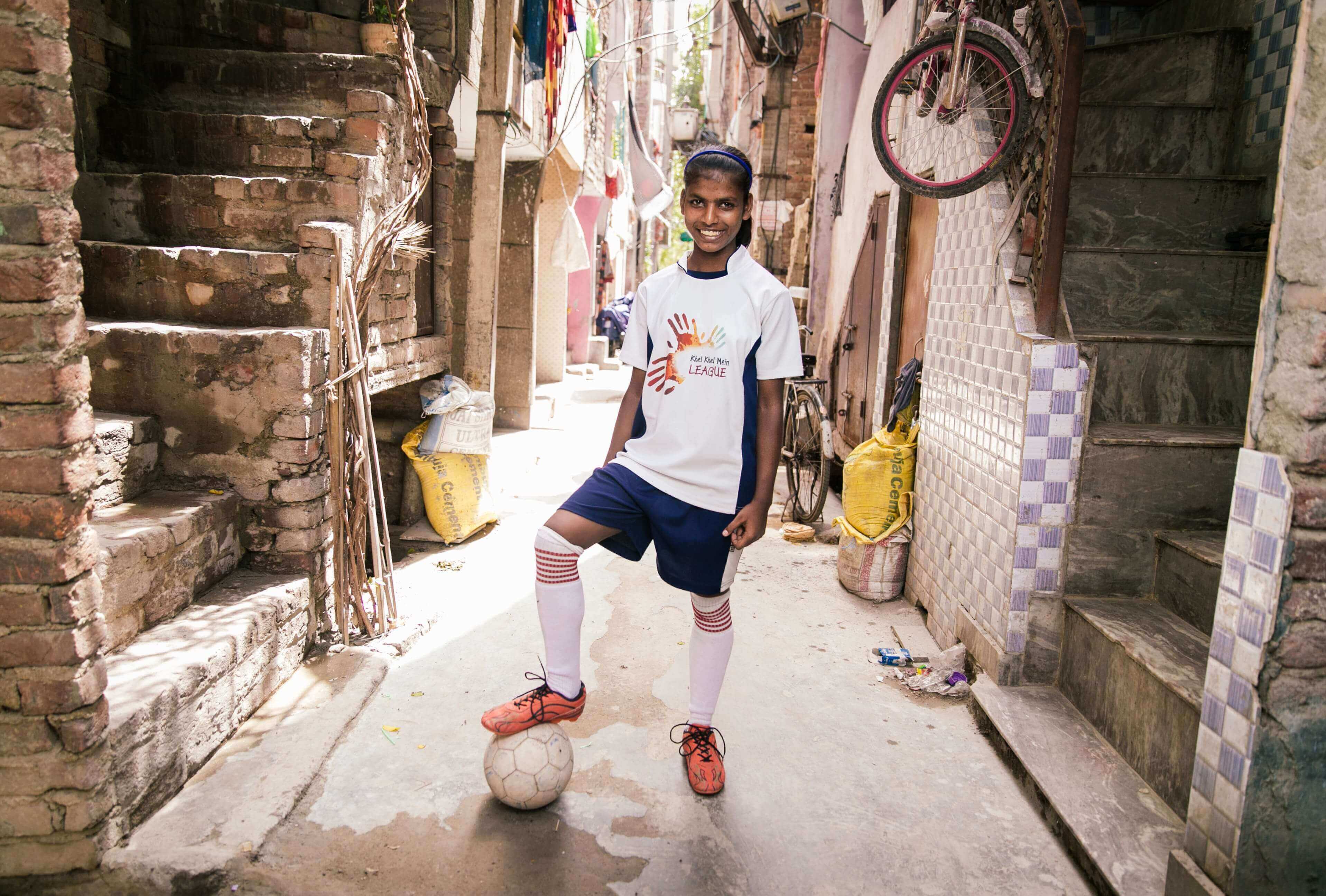
School Theatre Workshops @ Jahangirpuri
“I want to play football. Every morning before the school starts, all of us go to the park and play football with bhaiya and didi. Through this play, I was able to tell everyone what I want to be- a Football player!”
-Shaina, 13, is a resident of Jahangirpuri and is the eldest daughter in the family of four. Shaina has a father to look after her and three of her siblings. Recently, they came in contact with another NGO that works with Sports towards empowerment. Shaina likes playing football and as a participant in our workshops, she got the opportunity to tell her neighbours and community members that she wants to be a Football player.
Our second intervention in Jahangirpuri took place during the summer vacations in 2016. We conducted a 2-week long Expressive Arts’ workshop with students of K-Block School, aged 13-18. A small portable cabin within the school compounds was used for these workshops.
2 batches were created of girls and boys separately, with each of them coming in shifts. The workshops ran in the same time frame as their class schedules so it was easy for parents to send their children at the requisite time.
The focus of these workshops was a little different. Participants were asked to bring up instances and stories from their communities, which were then moulded into a short interactive performance. Through the course of the workshops, we introduced children to different techniques of theatre. Students really seemed to enjoy the warm up games and exercises, making the workshops light and easy for the participants. Constant power shortages coupled with the perpetual heat of June couldn’t deter the enthusiasm of these children. We normally see a decline in workshop participation as days progress, but this experience was a terrific exception. Half-way through our sessions, more students approached us, only to be denied participation because of paucity of space.
The facilitators also worked with Playback Theatre. This was the first time we had used this technique in a community setup. Instances of everyday life narrated by the participants were enacted by the facilitators. Seeing us take on their roles, some children volunteered to perform themselves.
The resultant performances were then showcased to parents and other community members. Another Playback Theatre exercise followed as a part of the consequent discussions. It is only from these discussions that we got a sense of the actual problems in the community. Municipally and administratively ignored, Jahangirpuri presents us with acute problems of urbanisation and exclusion. The seething levels of inter-community issues, coupled with inhabitable living conditions, make Jahangirpuri a complex area to deal with.
Our work with families and children continues. We are looking for partners to help strengthen our community presence and create opportunities for social entrepreneurship and self empowerment in the area.
-
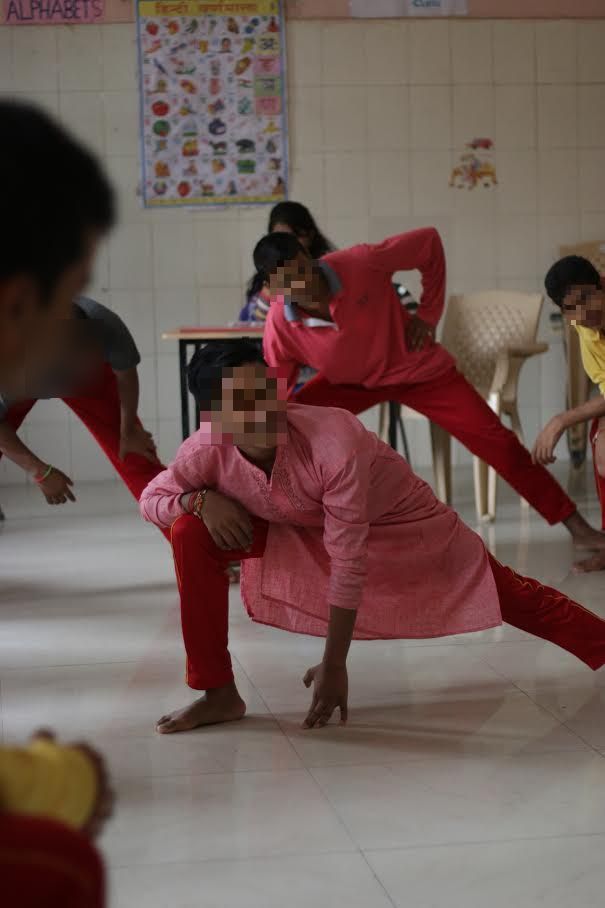
Intensive Theatre Workshops @ Aadharshila Observation Home for ‘Children in Conflict with Law’
“When I get out of here, I want to complete my education and support my family. I know I made a mistake, but I believe I can make things right. One day, when I have enough, I want to travel the world. Thank you for supporting me.”
– Kabir (name changed) was part of our Expressive Arts program in May (2017) this year. He performed in the play ‘Aadharshila Mein Ek Din – A Day in Aadharshila’. In an exercise where we asked our participants to draw an object of desire, he drew a phone with his mother’s number before he broke to tears. Today, Kabir his pursuing a Bachelors degree in Cosmetics and working in a salon to support his family.
We started working with a group of 15 inmates in the first week of May towards a workshop that culminated in a performance at the ‘Delhi Judicial Academy’ for Magistrates, members of Juvenile Justice Board and Child Welfare Committee . We explored the idea of ‘Dreams, Delinquency and Destitution’ in the context of ‘Youth at Risk’.
We started our workshops by introducing the children to basic theatre warm-ups and creative exercises before slowly moving on to ‘childhood dreams and aspirations’. Once we got to this playful core, the task ahead become easier and smoother. Participants shared their stories, circumstances, future goals, inhibitions and restrictions that have shaped their lives today. We also explored enabling oneself to overcome these barriers and look for respect where it matters the most: to the Self.
Working at the Home only strengthens our resolve in the core vision of the Foundation, that of equity and social justice. We do hope that this time spent can only pave way for more work in the future that is centered on the idea of healing and empowerment.
Many like Kabir have taken this chance and flesh out their aspirations from paper to real life. After a decade of work in the Sewa Kutir Complex, we feel the need to reach out to more children ‘Under Care and Protection’. If you’re interested in contributing to this program, please don’t hesitate to get in touch with us.
-

Home/Away International Theatre Festival
‘For as long as anyone can remember, the Banyan Tree has been the heart of the Jahan Nagari. A resettlement slum, hastily cobbled together during the ‘clean-up’ drive of New Delhi, Jahan Nagari is populated with migrants who gravitated towards those with similar language and customs, as the city’s streets became ghettos, where opportunists sought to stake a claim. A microcosm of any big city, Jahan Nagari has its power centres, its dark underbelly, as well as its pockets of culture and refinement.
Into this melting pot comes young runaway, Roshan, escaping from an alcoholic father and abusive stepmother, seeking shelter under the banyan tree. Through the eyes of a wide cast of characters, we experience the journey of the migrant, the insecurities and fears, and the longing to grow roots and call a place ‘Home’.
‘Bargad Ki Chhaon Mein – In The Shade of The Banyan’ was a performance that covered the subaltern landscape of an urban slum in Delhi. By fictionalizing Jahangirpuri (a resettlement colony in north west Delhi), the play focused on the key interplay of migration, class and a feeling of ‘loss’ that comes when one struggles to find Home.
We continued our association with the National Theatre of Scotland when they invited us to participate in the Home/Away International Theatre Festival. It was a celebration of Participatory Arts that saw 10 theatre companies from across the world share their experiences with community engagement.
For us, this platform was the perfect opportunity to display our work with the ‘Youth At-Risk’. Time spent at the Juvenile Observation Home had led us to Jahangirpuri with the intent of intervening even before the crime took place. A year spent in the community gave us our stories, which were carefully moulded into a theatre production directed by our Managing Trustee, Ms. Puneeta Roy.
Characters had a sense of realism and the audition process equally vigorous. After two rounds of intense auditions, the selected group of actors traveled with our direction team to Jahangirpuri to get a sense of what they were working on. Actors working with us on this production were professionals with a vast range of experience. In rehearsals and preparations that lasted 3 months however, we all shared a common vision.
Our debut performance as at the Aadharshila Observation Home for Boys, our source of inspiration for this work in the first place. We performed there for the Superintendent, Magistrates, members of Juvenile Justice Board and other organisations working in the sphere of Juvenile Law. But our best critics were the inmates, the young boys who watched the show and found themselves connecting to the characters in the play.
To know more about the story and the project, click on the link below.
INSERT LINK HERE
ADD BARGAD REPORT (TO BE MAILED)
-
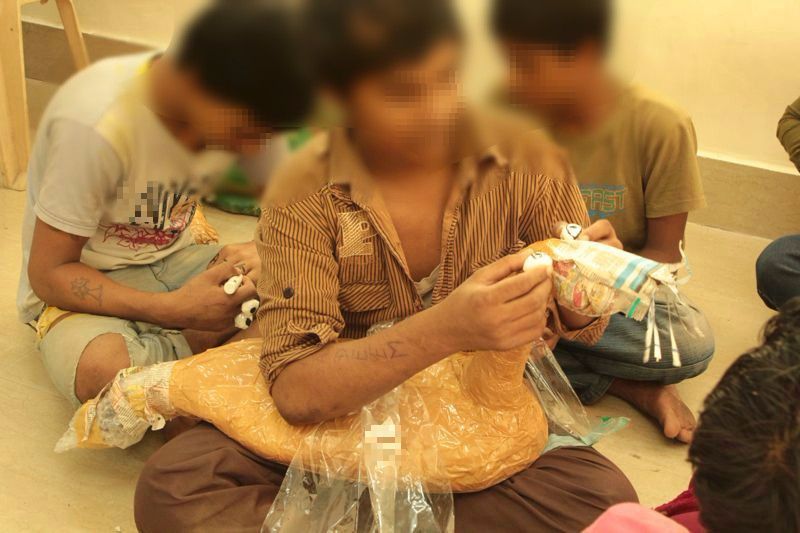
Expressive Arts Workshops with ‘Children in Conflict with Law’
THREADS OF HUMANITY was launched in 2009 at the Sewa Kutir Complex with the play titled ‘Main bhi Insaan hoon’ with the boys at Aadharshila observation home for ‘Children in Conflict with Law’. The program expanded to include the ‘Waiting Room’, where we facilitated Art activities with children waiting for their bail plea to be heard by the Magistrate.
While students from privileged schools and communities enjoy opportunities and resources at their behest, we realize that ‘Children in Conflict with Law’ fall under the category of ‘Youth At-Risk’. It encompasses that section of the young dividend that hasn’t been able to find its way in this ever growing economic disparity.
In keeping with our vision of Equity and Social Justice, this is a Community Volunteer Program which works with the intent of skill and talent sharing. We invite students from Delhi University to engage with young offenders, and be sensitized in the process. Master Practitioners from different disciplines share their expertise for the workshops.
The Foundation’s novelty in approach stems from the use of Expressive Arts to help engage young ones with self and society. In fact, this approach works best when you bring together young minds from different socio-economic backgrounds.
In this spirit of rehabilitation, we began constructive interventions at the Aadharshila Observation Home in the Sewa Kutir Complex, Kingsway Camp, through ‘Expressive Arts Workshops’ that focused on building the confidence and communication skills of the boys.
The Expressive Arts Program grew to include SPYM SAHYOG de-addiction center, a home for ‘Children in Conflict with Law’ undergoing drug rehabilitation. An intensive module with workshops each day of the week enabled participants to create their own forms of expressions through different mediums like Art, Creative Writing, Music, Drama, Waste Recycling, Puppetry and Physical Movement.
A few months later we added another important intervention to our work in the SAHYOG center– Kirloskar Brothers came on as our partner to engage with the boys in vocational training, taking them through pump repair and electrical training during their stay of 3 months.
We are constantly on the lookout for like-minded individuals who can partner with us in taking this program forward. As one of our longest running programs, ‘Threads of Humanity’ has also become a way to reach out to larger audiences through Art-based community interventions.
Get in touch with us to know more about how you can contribute.
-
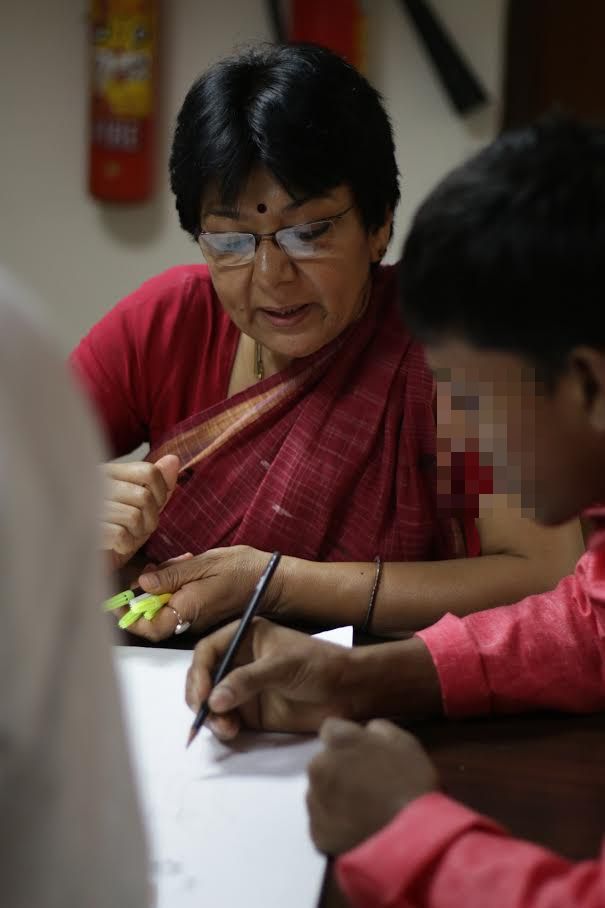
Workshops with Stakeholders at Delhi Judicial Academy
“I want to complete my education and become a big man one day” – Participant, Aadharshila Home
“I have always wanted to help people and through my work, I’ve managed to fulfill that dream” – Member, Child Welfare Committee
Be it the young, or the younger, everyone dreams. Our dreams connect us to our innocence and light, that makes us one with our being.
On August 25, 2017, the Foundation conducted it’s second Capacity Building workshop at the Delhi Judicial Academy for members of Child Welfare Committee, Juvenile Justice Board and organisations that work in the sphere of Juvenile Law. A small and engaging performance by the boys from the Aadharshila Observation Home titled ‘Khwaabon Ke Par – Wings of Dreams’, was followed by an Art activity that engaged all stakeholders on one platform and encouraged them to share their dreams with each other.A magical afternoon turned surreal because of the interactions that helped everyone understand and empathize with one another. It also promised to bring back the same innocence within all participants that helped them remember their lifelong dreams and aspirations.Our first session was on May 26, 2017 where 12 boys from the Aadharshila Observation Home for ‘Children in Conflict with Law’ had stepped out of the Home for the first ever time to perform a play. An intense 15 day Expressive Arts Workshop Module with the boys had helped us develop an interactive performance. Our focus was to use this time to expose the boys to a world of theatre and the arts. The resultant performance titled ‘Aadharshila Mein Ek Din– A Day in Aadharshila’ was created through personal stories and narratives, displaying power struggles in everyday life that the young ones face. This interactive performance was presented at the Delhi Judicial Academy for members of Juvenile Justice Board and Child Welfare Committee.
The performance was followed by a Playback Theatre session with the audience members. Committee members of the Juvenile Justice Board and Child Welfare Committee were encouraged to share their stories with us. The Yuva Ekta Playback Theatre group brought these stories to life by performing them through different narrative styles. The idea was to contrast these stories to the ones shown by the boys and help them relate to each other in a session that was titled ‘Understanding Childhood: Dreams, Delinquency and Destitution’.
The Delhi Judicial Academy is the premier institute for training new members of the judiciary and extra-judiciary bodies. As a part of their training sessions and curriculum, they organise conferences and discussions. The Yuva Ekta Foundation has been invited twice to the Academy to conduct sessions on ‘Capacity Building’ for members of Juvenile Justice Board and Child Welfare Committee.



